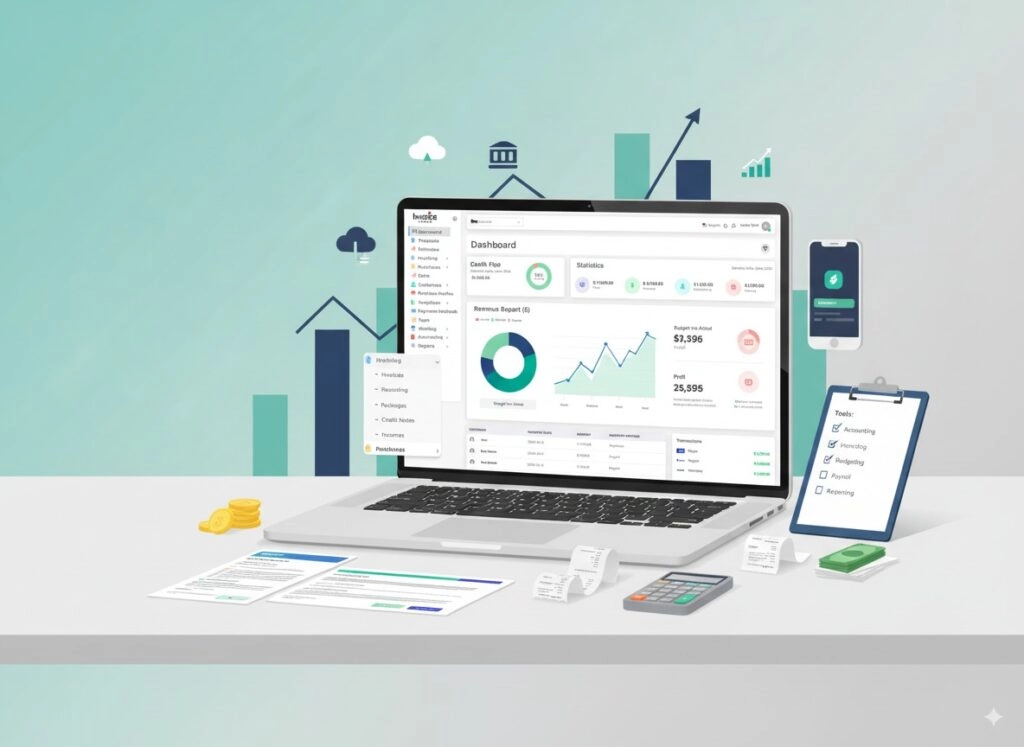Few elements are as fundamental to running a thriving small business as mastering financial management. Whether you’re a solopreneur, a digital agency, or a business owner with a growing team, achieving sound financial health is a core driver of success and sustainability. Robust financial management enables clarity, confident decision-making, and preparedness for both opportunities and challenges that arise as your company grows.
In this guide, you’ll uncover essential strategies, best practices, and powerful tools that help streamline your finances—so you can focus on building a successful business. From expense tracking to leveraging modern accounting platforms, these insights are designed to empower small business owners to take control of their financial future.
Are you curious how avoiding the right invoicing and financial tools could impact your bottom line? Don’t miss this deep-dive into the hidden cost of avoiding an invoicing program and why mastering your financial operations truly matters.
Essential Principles of Financial Management for Small Businesses
Mastering financial management begins with understanding the core principles that underpin healthy business finances. For every small business, these principles lay the groundwork for effective decision-making and growth.
- Setting Clear Goals: Define precise business goals—both short-term and long-term. This clarity enables you to align every financial strategy and action with your bigger vision.
- Strategic Planning: Comprehensive budgeting and planning allow you to anticipate future needs, allocate resources wisely, and create a roadmap for business success.
- Consistent Tracking: Maintaining up-to-date records of your income, expenses, and cash flow is key to managing your business with confidence. Regular financial monitoring minimizes unpleasant surprises and reveals opportunities for improvement.
- Regulatory Compliance: Adhere strictly to local, state, and national regulations for tax reporting, payroll, and business accounting. Proper compliance safeguards your business and builds trust with clients, employees, and regulators.
Ultimately, the foundations of sound financial management revolve around transparency, discipline, and adaptability. Business owners who take these essential strategies seriously lay the groundwork for healthy growth and greater resilience.
If you’d like to dive deeper into what metrics matter most for your business, check out essential financial metrics every small business owner should track for actionable insights.
The Importance of Cash Flow Management for Business Growth
When it comes to financial management, nothing is more important than mastering your business’s cash flow. Cash flow management refers to how you monitor, control, and optimize the flow of money into and out of your business. For most small businesses, effective cash flow management can mean the difference between steady growth and unexpected financial roadblocks.
- Why Cash Flow Matters: Positive cash flow ensures you have enough liquid assets to cover operating expenses, pay suppliers, meet payroll, and take advantage of new opportunities as they arise.
- Common Challenges: Late client payments, unexpected expenses, seasonal dips, and overinvestment in inventory can disrupt cash flow and jeopardize financial stability.
Strategies for Healthy Cash Flow:
- Invoice Promptly: Send invoices as soon as work is completed. Consider automated invoicing tools for quicker turnaround.
- Set Clear Payment Terms: Define your payment expectations up front—clarity minimizes late payments and confusion.
- Monitor Receivables: Track outstanding invoices regularly. Automated reminders can speed up client payments.
- Diversify Revenue Streams: Relying on a single client or channel increases vulnerability. Expand your customer base for stability.
- Keep a Cash Reserve: Having a cash cushion ensures you’re ready for emergencies or slow periods.
A firm handle over your business’s financial inflows and outflows is essential for small business success. For more practical strategies and common pitfalls, refer to managing your cash flow: tips for small business owners.
Expense Management: Keeping Your Business On Track
Expense management is the unsung hero of financial management for small business owners. Keeping an eye on every business expense lets you optimize your operational spend, reduce costs, and keep your business finances healthy.
- Track Everything: Record all expenses—from rent and utilities to software subscriptions and travel. Utilize software that links directly to your bank and credit accounts for real-time updates.
- Identify Unnecessary Spending: Regularly review spending categories and identify recurring charges or services you may no longer need.
- Establish Spending Policies: Set clear guidelines for employees regarding what expenses are allowed and the documentation required for reimbursement.
Fostering transparency around business expenses not only supports accurate financial records but also brings peace of mind to business owners. Leveraging expense tracking tools and automating workflows can help reduce manual effort, allowing you to focus on strategic, revenue-generating tasks.
For a step-by-step approach to keeping expenses under control, see the ultimate guide to expense tracking for small businesses.
Accounting Fundamentals: Building a Strong Financial Foundation
Solid accounting is at the core of every successful small business. Understanding and applying accounting fundamentals shape not only your day-to-day operations but also how your company grows and competes.
- Understand the Basics: Learn about double-entry bookkeeping, the chart of accounts, and the importance of reconciling your records regularly. These building blocks ensure your business can weather audits and financial scrutiny.
- Keep Personal and Business Finances Separate: Mixing these leads to confusion, tax challenges, and potential legal risks. Always operate with dedicated business bank accounts and credit cards.
- Timely Bookkeeping: Recording transactions when they occur is crucial for accurate financial records. Cloud-based solutions make it easier to record and retrieve data from anywhere.
Adhering to disciplined accounting processes helps you not only comply with regulations but also understand your business’s true financial health. Small business owners who treat bookkeeping with the same care as customer service or marketing set themselves up to operate more professionally.
Is manual record-keeping holding you back, or are you still unsure which approach is best for your business? Explore the comparison in bookkeeping service: online or classic bookkeeping?.
The Power of Financial Statements and Reporting
Financial statements are the ultimate measuring stick of a business’s financial knowledge and performance. From the solo freelancer to multi-person agencies, regular access to clear financial reporting is vital for informed decisions and healthy operations.
- Balance Sheet: Provides a snapshot of your business’s assets, liabilities, and owner’s equity at a particular moment in time. This helps you understand what your company owns versus what it owes.
- Income Statement (Profit & Loss): Summarizes revenues and expenses over a period. It tells you whether your business is making or losing money.
- Cash Flow Statement: Tracks the movement of cash in and out, highlighting business liquidity and short-term viability.
Financial reporting isn’t just about paperwork—it’s how you identify trends, spot strengths and weaknesses, and make evidence-based business decisions. Today’s digital tools even automate much of the process, reducing the manual workload and risk of error.
Curious about how automated reports can boost your business knowledge? Learn how to generate reports that help drive performance and decision-making.
Leveraging Accounting Software for Better Financial Control
The days of managing business finances with only handwritten ledgers or basic spreadsheets are quickly fading. Modern accounting software offers small business owners a robust and easy way to centralize financial operations, minimize mistakes, and accelerate business growth.
- Automated Data Entry: Reduce the time spent manually inputting data by connecting your accounts, invoicing clients, and capturing expenses in real-time.
- Error Reduction: Accounting tools systematically organize and categorize transactions, lowering the risk of human error in your books.
- Integration with Other Platforms: Modern solutions support seamless integration with payment gateways, CRM systems, and project management tools, making your workflow much more efficient.
- Remote Access and Team Collaboration: Cloud-based accounting platforms allow business owners and their teams to check financial data anytime, from anywhere.
To truly master financial management, switching from spreadsheets to professional invoicing and accounting software is a game-changer. Solutions like Invoice Crowd bring together invoicing, reporting, and expense management within a single, user-friendly dashboard. This is especially vital for small agencies and freelancers who need a cost-effective, flexible management system.
Discover more reasons to make the switch in why you should switch from spreadsheets to professional invoicing software and see the difference it can make for your business.
Payroll Management: Ensuring Timely and Accurate Compensation
Ensuring employees—and even contractors—are paid correctly and on time is a cornerstone of trustworthy business practice. Payroll management plays a critical role in financial activities for small businesses, directly impacting morale and legal compliance.
- Legal Compliance: Meeting payroll tax regulations and employee withholding requirements is non-negotiable. Payroll mistakes can lead to costly penalties.
- Automation for Accuracy: Today’s payroll solutions automate calculations, tax filings, and even direct deposits. This not only saves time but guarantees employees are paid on schedule.
- Employee Satisfaction: Timely, accurate compensation ensures your team is motivated and confident in your business leadership.
Integrating payroll into your financial management solution creates a seamless process for small business owners. Explore how investing in the right software can simplify your entire payroll operation in run your business efficiently by investing in accounting software.
Separating Personal and Business Finances – Why It Matters
Many new entrepreneurs start by blending personal and business finances—but this is one of the most common pitfalls for small business owners. Keeping business and personal finances separate is not only smart financial management, but also crucial for business growth and risk mitigation.
- Simplifies Bookkeeping: With separated accounts, it’s easier to track income and expenses related to your business, leading to accurate records and reporting.
- Reduces Tax Headaches: Clear boundaries facilitate smooth tax preparation and accurate deductions, lowering audit risk.
- Enhances Professionalism: Having dedicated business bank accounts and credit cards demonstrates legitimacy and credibility to clients, vendors, and lenders.
To keep your company on firm financial footing, consider opening a business bank account as one of your first steps. Learn about the benefits of separating finances in personal banking vs business banking.
Using Financial Data to Identify Growth Opportunities
One of the advantages of strong financial management is using your data to fuel business growth. Analyzing financial reports can reveal potential revenue streams, inefficiencies, and smart areas to invest effort and capital.
- Spot High-Margin Activities: Identify the products, services, or clients generating the most profit. Doubling down here can accelerate business growth.
- Evaluate Performance Trends: Tracking performance month-to-month or year-over-year identifies risks and promising opportunities before they become critical.
- Invest for the Future: Use your data to project and plan for hiring, equipment purchases, or marketing campaigns that align with your business goals.
Many business owners use tools that offer robust analytics dashboards and customizable reports. For instance, having access to real-time invoicing and payment data lets you forecast earnings gaps and address issues quickly.
Curious how this translates into action? See how invoicing technology can directly bolster your growth in how invoicing software can help boost your business.
Accessing Professional Financial Advice and Support
No matter how hands-on you are, there are times when guidance from a financial advisor or business coach is invaluable. Seeking professional financial advice ensures your business remains compliant, optimized, and resilient.
- When to Consult a Professional: Major business changes, tax questions, or plans to scale are ideal times to involve an expert.
- Benefits of Expertise: Advisors offer insights you may not consider and help you interpret financial statements, assess risks, and build winning strategies.
- Customized Solutions: An external perspective can help you tailor financial management tactics to your unique needs and industry requirements.
Making room in your budget for expert financial support is a smart investment in your business’s long-term viability. To ensure you’re getting the right help, consider reviewing guidance on how to choose an accounting service that fits your company’s goals.
Conclusion: Putting It All Together for Small Business Success
An organized, strategic approach to financial management often separates successful businesses from those that struggle. By following the principles outlined above—mastering cash flow, embracing expense discipline, adopting modern accounting solutions, seeking the right advice, and leveraging your data—you’re putting your company on a path to stability and growth.
For small businesses looking to streamline these essential financial operations, integrated platforms like Invoice Crowd can centralize invoicing, expense tracking, financial reporting, and more in one accessible management system. Automating these core functions frees up your time and keeps you focused on growth, not paperwork.
If you’re ready to help your business thrive, start exploring modern accounting tools and proven strategies today. You’ll be setting the stage for lasting financial health and the long-term success every business owner deserves.



